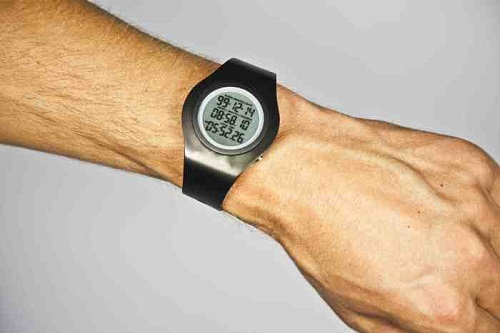If you’re making a resolution for 2014, why not make the ultimate resolution and decide to live a happier life? Tikker, brainchild of Swedish inventor Fredrik Colting, is a watch that prods you into using your time more wisely, by counting down your life expectancy and reminding you that every second matters.

One line displays the number of years, months, and days, while a second displays the hours and minutes until you die. It’s not completely accurate, but its life expectancy algorithm is based on the kind used by the Federal Government, so there’s some merit. The watch consider your age, weight, smoking habits, gender, stress, and country of origin to make its prediction; the effect is chilling regardless of how symbolic it is.
Colting, a gravedigger at one point in his life, designed the watch as a reminder that life is fleeting and it should not be spent worrying about trifles. He says that the experience, “made me think about death and the transience of life, and I realized that nothing matters when you are dead. Instead what matters is what we do when we are alive.”

Ironically, Colting nicknamed his watch “the happiness watch,” not the “portable grim reaper.”
Tikker’s intention is to have users reevaluate their life and choose more positive outcomes. Is it worth feeling angry at this moment? Should I continue with my depressing job?
And there is science backing up this claim: two studies published in the Journal of Association for Psychological Science show that thinking about death makes one more appreciative of life.
Psychologist Sheldon Solomon at Skidmore College states the principle behind Tikker date back hundreds of years into human history, pointing out the Hindu Sadhus of a particular sect, and European medieval monks that kept human skulls as reminders of cherishing life.
Incidentally, there is a darker school of thought based on research and tests conducted by Solomon himself, demonstrating that the reminder of fleeting mortality can also bring out the worst in people, making them xenophobic, aggressive, and hostile. Positive or negative implications vary from person to person.
Solomon tells NPR corresponded Lulu Miller that: “Behavior changes too, if people are given the opportunity to physically hurt someone different than themselves are being reminded of death, they become particularly hostile and aggressive and more likely to hurt them.” He associates the psychological inability to accept one’s potential death as the cause of human-kind’s long history of violence toward people who are different.
NPR’s Lulu Miller fitted two individuals with Tikkers to test their various psychological responses. While initially pleased with the watch, Jeff Rosenthal became increasingly anxious and aggravated over wasting time doing mundane but necessary tasks such as sitting in traffic or sorting through junk mail. By contrast, wife Teressa Rosenthal’s reaction was completely opposite. What began as stress and caution blossomed into genuine joy after the first night. Teressa likened her subsequent feelings to ear-to-ear grin of early love.
So if you acquire your own Tikker, use it responsibly. Solomon is ambivalent toward the watch, citing that more research needs to be conducted. He warns that possible side effects may include: physical aggression towards people not like you, racism, reckless-driving, greed, homophobia, binge eating and drinking, risky behavior and bad financial decisions.
I recommend you test drive it for a week and observe your outcome.
Story via NPR
Advertisement
Learn more about Electronic Products Magazine





